When you come to Asheville, North Carolina, it’s easy to see what draws people to the city. Located at the confluence of the French Broad and Swannanoa rivers, surrounded by the beautiful Blue Ridge Mountains, Asheville is a paradise for outdoor enthusiasts. For those who like to hike, bike, fish, and paddle, Asheville is the place to be. And then there’s the reason that more and more people are coming to Asheville, both to visit and stay. Beer. It’s a huge business here, with breweries bringing in an estimated $935 million to the community.
With more than 60 breweries and taprooms in and around this city of 94,000, Asheville has one of the highest breweries per capita ratios in the entire U.S. That’s about 47 more breweries than in 2014, when Men’s Journal wrote that Asheville was the “next craft beer capital.”
What makes this city so attractive to brewers and beer lovers—and continues to fuel its growth as a world-class beer destination? A recent trip to Asheville gave us the chance to talk to some of the folks at the forefront of the beer and tourism industries here. As it turns out, it’s not just something in the water. It is the water.
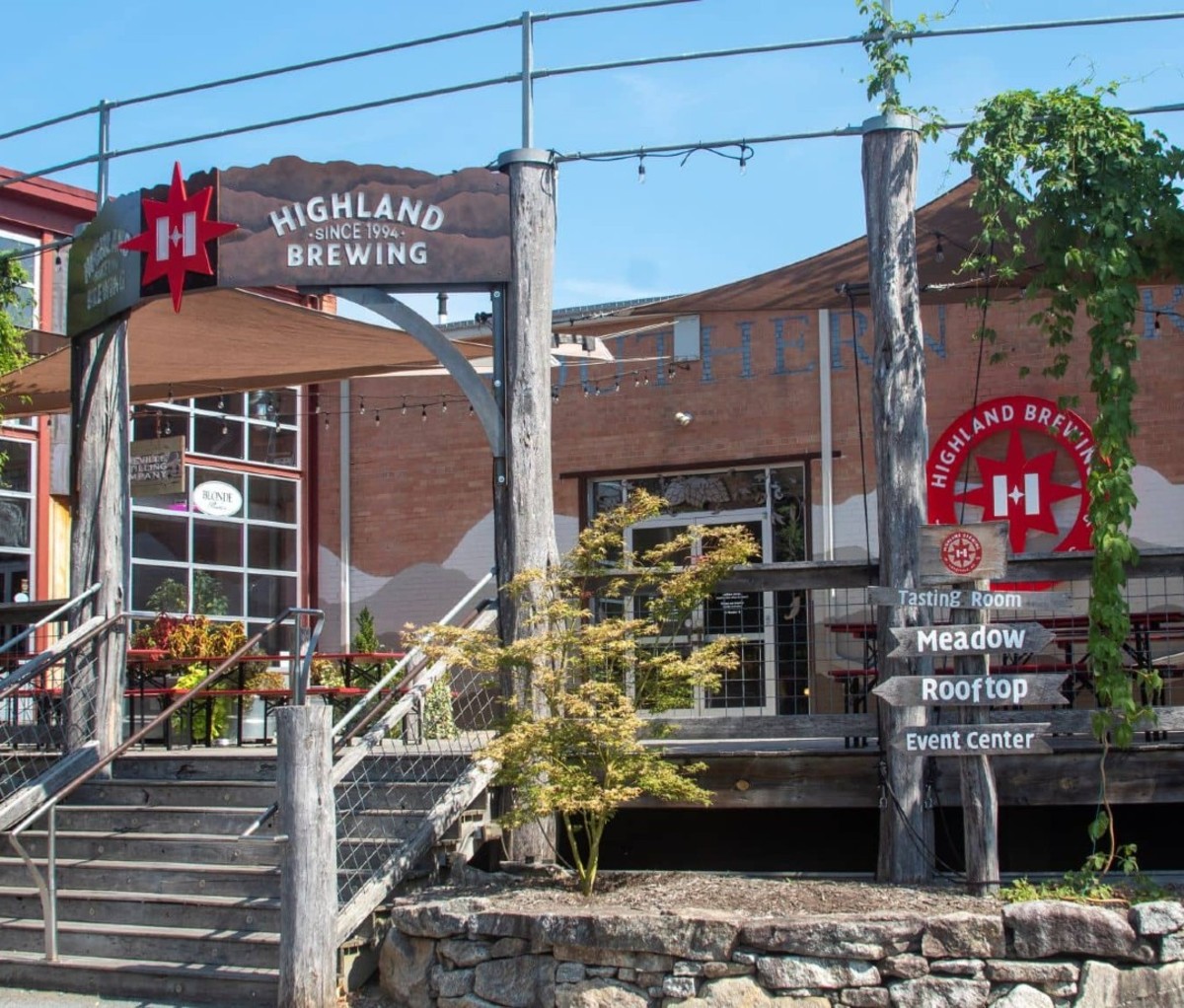
Highland Brewing Co.
“You know why the water is so good?” Leah Wong Ashburn, President and CEO of Highland Brewing, asks. “Because we get it first.”
Ashburn is kidding, but the Highland brewery is high in the hills of East Asheville, near to the city’s primary water sources—the North Fork and Bee Tree reservoirs. As the City of Asheville’s Water Resources Department says, the city has “one of the best sources of water in the country.”
To get to Highland, you take a winding road to the top of the hill. It truly is a fitting location for the name. However, the name came long before there was ever a brewery on a hill. In fact, the name of the brewery was a nod to Asheville’s Scottish heritage and its original location was a basement.
Founded by Oscar Wong in 1994, Highland is Asheville’s first craft brewery. Wong and his family had moved to Charlotte from the Northeast. Every weekend, they came down to Asheville to experience its maker culture. When it came time for retirement, Oscar Wong was looking for something to do in the city. It turned out that brewing was the perfect choice. Ashburn, Oscar’s daughter, says that her mother used to joke, “He could get a job or a hobby, but he needed to get out of the house.”
When Highland opened, it was a production-only brewery and its first location was a downtown Asheville basement, next to an alley. This site was, as Ashburn jokes, “not meant for visual or aromatic consumption.”
Since those early days, Highland has grown considerably. There’s a taproom in the S&W Market in downtown Asheville, while the main location on the hill houses a large brewhouse, the taproom, and an event center. There’s also an outdoor area with a meadow bar, as well as a disc golf course (soon to be 18 holes) and volleyball courts. These last two are the work of Ashburn. Since taking over the presidency of Highland in 2015, she has focused on what she calls “active socialization.” Ashburn wanted activities that bring people together and, as she points out, sports and beer drinking do that very well.
Beer: Just as Highland was the first brewery, Gaelic Ale was the first beer. AVL IPA is a West Coast-style IPA. Cold Mountain, a highly sought after winter ale, signals the start of the holiday season for some beer drinkers.
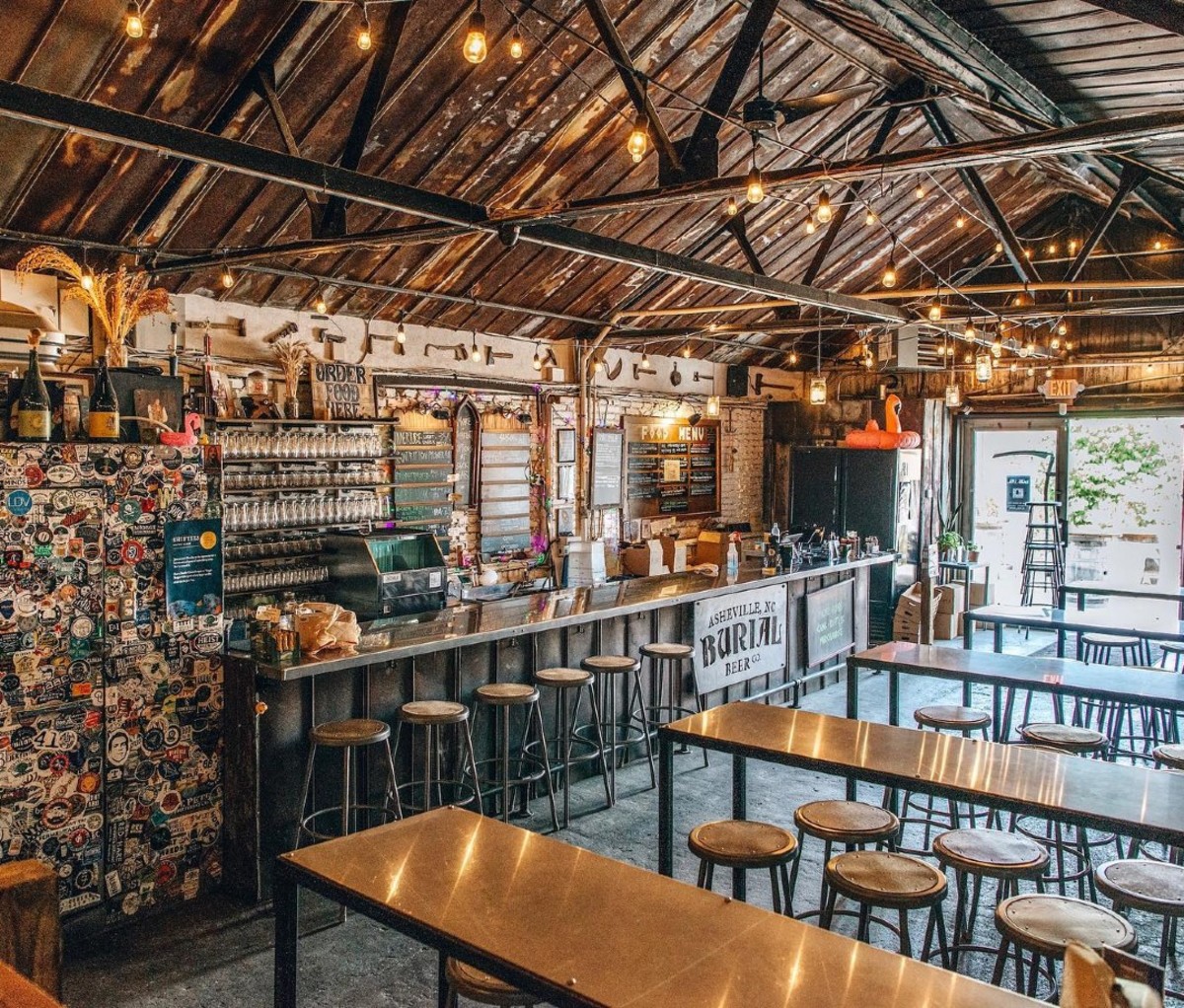
Burial Beer Co.
Douglas Reiser and his partners made their way to Asheville via stops in New Orleans and Seattle. For them, Asheville has been a “wonderful crossroads” for a brewery. The city is in the mountains, but it was also only four hours from the ocean. And, when they arrived, Asheville had a “low to medium” cost of living, great water, and cheap power. Most importantly for future brewery owners, “It was affordable to own a home and—maybe—a business.”
Reiser says that Burial was always meant to be “an industrial, dark brand.” You pick up on that impression from the scythes that function as front door handles. That mood also comes across in beer names such as “And Together We Find Fascination in Things So Disregarded” and “These Sacred Trespasses Against the Misunderstood.” Later, when we ask a bartender if customers order beer by the full name, he explains that drinkers typically find a word or two to get their choice across. But this interaction is important to Reiser, who wants customers to visit Burial. “This brand and this story telling is what we’re good at,” he says.
This customer engagement is rising as Burial continues to open more locations. In 2013, Burial started renting the front of the building it’s still in. The back of the building was rented by a tenant who was famous for, in Reiser’s words, “nitrous-powered bowling parties.” Eventually, Burial was able to buy the entire building. In 2018, they opened a taproom in Raleigh. A year later, they bought a former Civilian Conservation Corps property in Asheville that would become Forestry Camp. Next up, is a music venue, rooftop bar, and kitchen, all in a building next to the original location.
As for the competition of having so many competitors in town? “I want 150 breweries,” says Reiser. “It’s the nature of competition. I love that shit.”
Beer: Dark is a Bohemian lager with, by Burial standards, a rather short name. Brewed with fresh marigolds and orange zest, Careening Towards the Edge of Deception is a saison. Aged in a foudre, Exhumation of Restless Souls is a Vienna-style lager.

DSSOLVR
When we asked the co-founders of DSSOLVR what makes Asheville the perfect place to brew beer, they had different answers.
“It’s the community,” explains Mike Semenec, who’s in charge of marketing and branding.
“Water,” says Vince Tursi, the head brewer. “The water here is incredible,” he goes on to explain. “It’s incredibly easy to make great beer.”
Before opening DSSOLVR in 2019, Tursi was working at Burial. In preparation for opening the doors to his own brewery, he worked on 42 collaborative beers with other breweries. As for opening in a city that already has a lot of breweries, Tursi said it was a no-brainer. He “wanted the competition.”
The co-founders also say that Asheville is an incredibly beer friendly city, with the arrival of heavyweights Sierra Nevada and New Belgium playing an important part in supercharging the scene. It also helps that the local Asheville-Buncombe Technical Community College—also known as A-B Tech—has its own brewing, distillation, and fermentation program, which means new brewing talent is always on the way.
What differentiates DSSOLVR, explain the founders, is that it’s at the pivot point between old school and new school. And because they also make wine, cider, and mead, Semenec says. “We exist in all the fermentation spaces.”
As for the name DSSOLVR, Semenec explains that it represents the “blending of the Asheville community with the brewery.” Also, Tursi jokes, “We couldn’t afford any more vowels.”
Beer: Thank You For Existing is the brewery’s flagship Kolsch, while Eternal Mourning is a funky IPA made with three yeast cultures, including one from Tursi’s front yard. Your Dog Here, featuring photos of 200 or so dogs, was brewed as a fundraiser for the Asheville Humane Society.
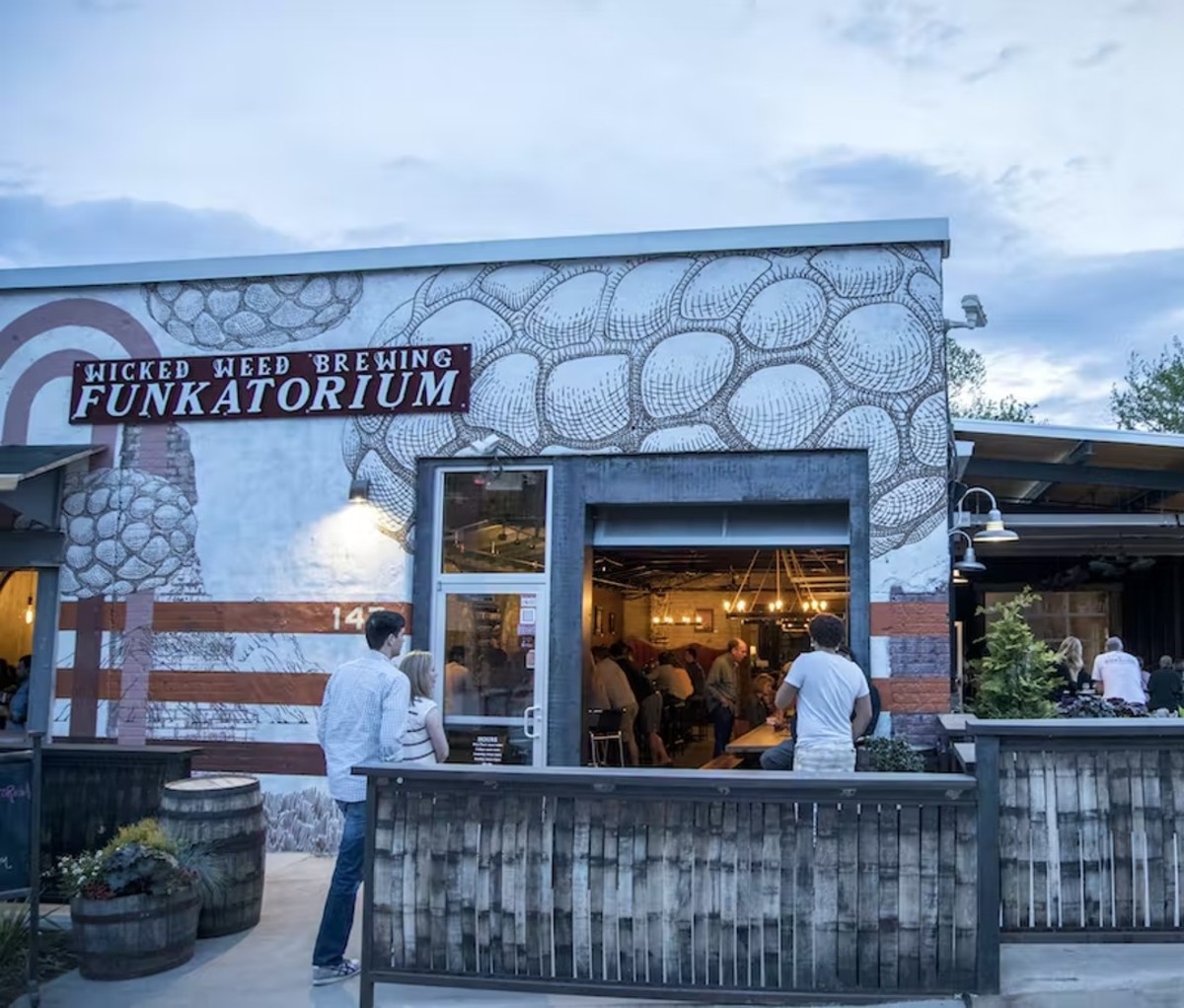
Funkatorium
Wicked Weed opened its first Asheville brewpub location in 2012. Two years later, the brewery opened the Funkatorium, a taproom dedicated to sour and funky beers. Think of a fruit and Funkatorium probably has it in sour form. This is also where winemaker Jen Currier is working on natural wines (and beers and ciders) and taking them in fascinating directions. She’s making for Wicked Weed’s Vidl line of wines such as Blaufränkisch, a light-bodied red that adds Brettanomyces for its distinct funk, and Contact, an orange/rose hybrid.
Next door is Cultura, a fine-dining restaurant where Executive Chef Eric Morris is also focusing on fermentation. Among the dishes when we were there, beef okonomiyaki (a savory Osaka-style street pancake that tastes like an upmarket Big Mac) and Dan Dan noodles (made with fermented milkcap mushrooms that you’ll want to eat every day for the rest of your life) were two of our favorites.
Beer: At the Funkatorium, you can get Cerise Morte with Montmorency cherries or Medora made with blackberries and raspberries in red wine barrels. If sours are not your thing, you can always get a Wicked Weed Pernicious IPA at Cultura.
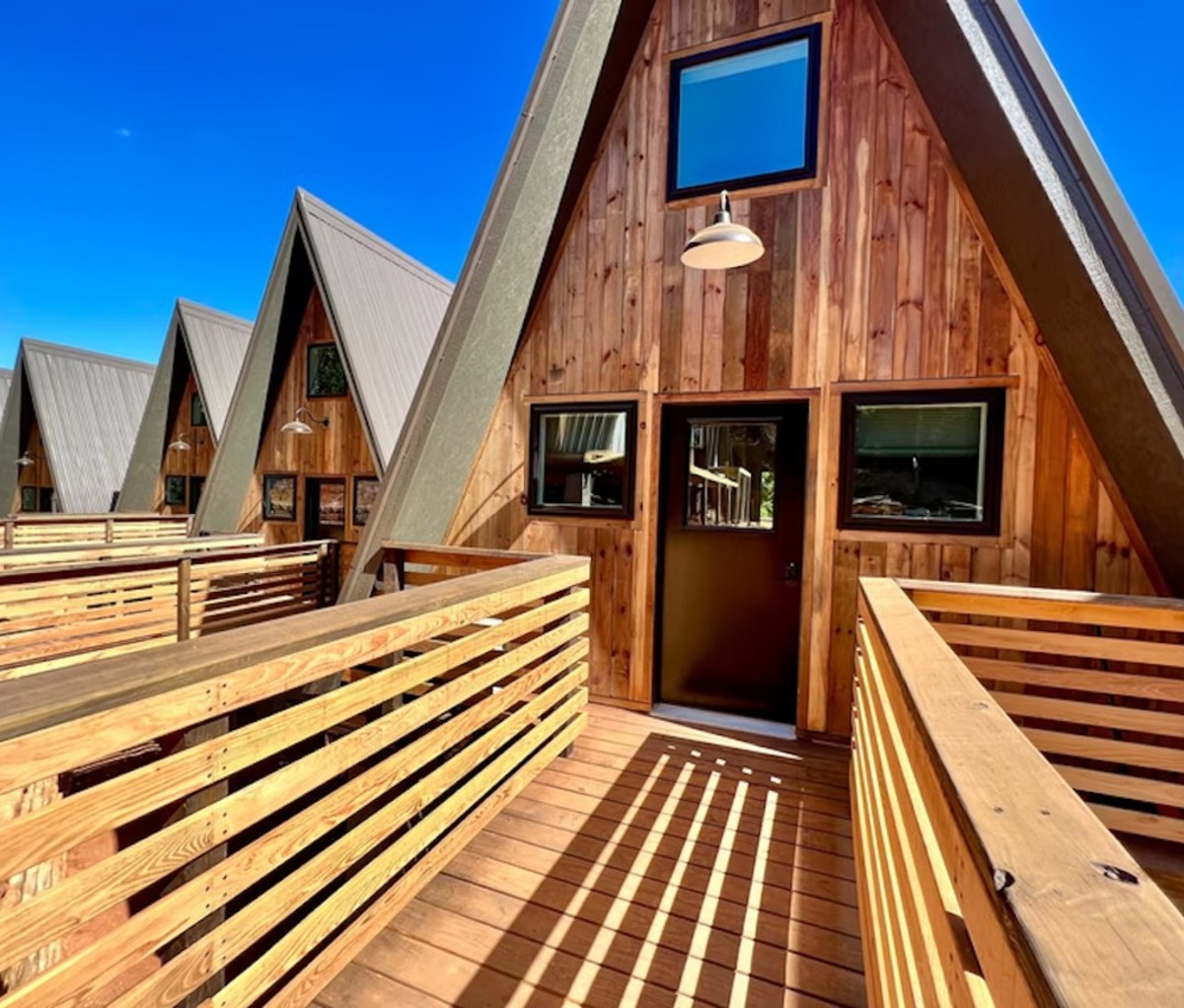
Wrong Way Lodge & Cabins
Water isn’t only for beer in Asheville. A self-described dirtbag, Shelton Steele has been kayaking North Carolina rivers for years. Staying close to the water, he went on to work for Catawba and Wedge breweries as a manager. But he was looking to do something outside of that world, specifically connected to being outside. According to Steele, the idea for Wrong Way came during a session of “brown liquor brainstorming.” He and partner Joe Balcken, a former river guide, spent the next couple of years looking for the perfect location for their Wrong Way River Lodge & Cabins and it seems like they found it.
Located just across the street from the French Broad River “at the intersection of urban and the outdoors,” Wrong Way consists of 16 cozy, A-frame cabins and a communal lodge. According to Steele, they “wanted to give people a more complete Asheville experience.” As part of that experience, the cabins don’t have televisions, just record players with an eclectic collection of LPs. Steele says this is on purpose. He and Balcken believe that people need to get outdoors to truly understand Asheville. He sums it up as, “Get out there. Do cool shit.”
Beer: Wrong Way isn’t a brewery, but it did just get a license to sell beer on the premises. In a glass-fronted fridge in the Lodge, you’ll find beers from Sierra Nevada, French Broad River Brewery, and Asheville Brewing Company. After a day of exploring, our favorite was tall boys of Julian Price Pilsner from Wedge.
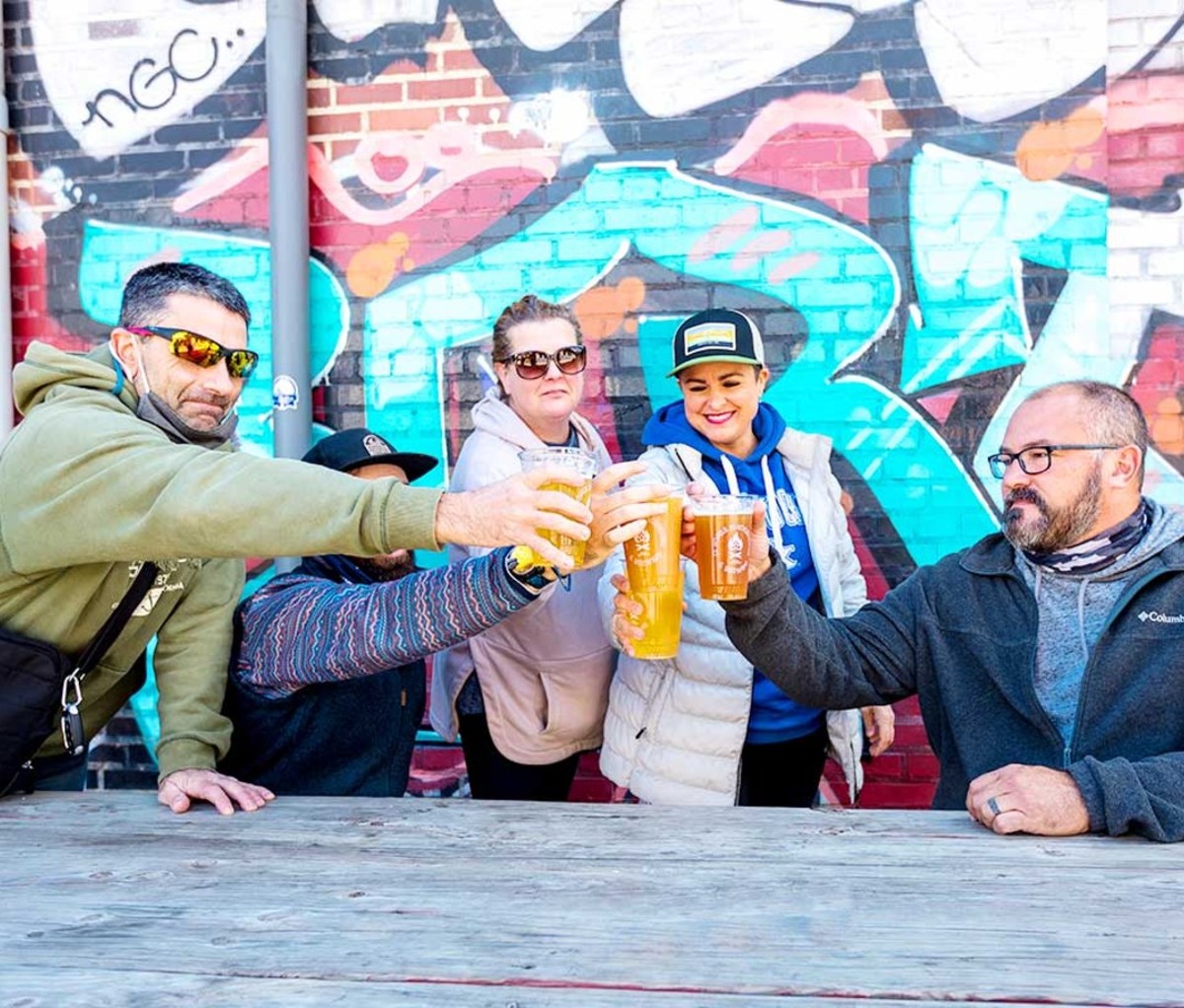
Asheville Adventure Company
Want a painless way to explore the breweries of Asheville? We went on a e-bike tour with Asheville Adventure Company that included stops at Burial, Hi-Wire, and Catawba. As long as you keep an eye on your consumption levels, it’s a great way to zoom around the hilly streets of the city. Or, if riding a bike and drinking doesn’t sound like a good combination to you, the company also offers a party bus brewery crawl.

Odyssey Co-op Gallery
Oscar Wong, the founder of Highland, was originally drawn to Asheville by its maker culture. And that arts and crafts scene is still going strong today, especially in the River Arts District. Here, you’ll find more than 270 working artists working along the French Broad River. We stopped at the Odyssey Co-op Gallery, home to 21 local ceramic artists who display their work, while also renting studio and display space to other ceramicists. Speaking to artist Chiwa Clark, who makes intricately painted earthenware wall pieces, we got on the subject of Asheville’s beer scene and water. She attested to how good the water is here, saying she’d made a porter from water she’d gathered from a nearby mountain stream.
“That’s how I wooed my husband,” Clark explains.
from Men's Journal https://ift.tt/lX3gB9W
No comments:
Post a Comment